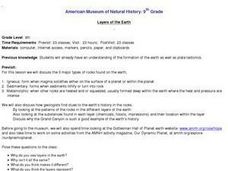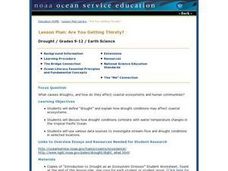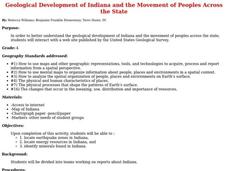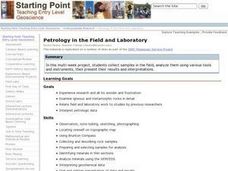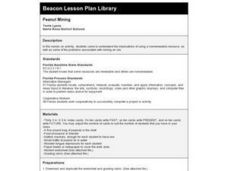Curated OER
Fossil Impressions of Ancient Life
Students make a mold using Plaster of Paris and then make a cast using that same mold. They pick a fossil and describe how it looks. They write a fictionalized story about its life, or burial. (
Curated OER
Rocks Up!
Young scholars will design and build a structure to support a rock. Students will use their knowledge of movement of objects to determine the proper base to be built to support their rock. Young scholars will explore their natural area...
Curated OER
I Spy
Second graders play the game I Spy to help identify objects made from rock. They investigate the properties and uses of rocks and go on an I Spy search on the playground. They sort pictures according to living and nonliving objects.
Curated OER
What if the Mormons had not come to Utah?
Fourth graders use critical thinking, evaluation, and geography skills to find alternative locations that Brigham Young could have taken the Mormons to settle.
Curated OER
Are You Getting Thirsty?
Students study droughts and how they affect communities and coastal ecosystems. In this ecosystems lesson students use data to examine drought conditions in certain areas.
Curated OER
They Don't Just Eat Grass
Middle schoolers explore and examine different types of feed used for livestock. They discuss types of feed, the need for energy and health, and create graphs of food compared to categories. Students organize data and complete worksheets...
Curated OER
From Granite to Paper
In this weathering worksheet, students read about physical and chemical weathering and how kaolin in used in paper. Then students complete 4 short answer questions.
Curated OER
Journey Through Time
Students examine the movement of the Bison over the land bridge. In groups, they use the events to put them into the correct sequence. They apply measurement to chronological time and read more information about the land bridge.
Curated OER
Bison Calculations
Students discuss how animals are cared for when they are captured. Using calculations, they determine how much food and water it takes for one bison and compare their water intake to humans. They also compare their weight to that of a...
Curated OER
What is a Ruminant?
Students examine the way bison eat and digest their food. Using a diagram, they follow the food from one compartment to the next. They discover that bison are ruminants and discuss why the bison need four stomachs.
Curated OER
Analyzing a Picture
Students examine various photographs and identify three conclusions from them. Using the pictures, they write their own story based on their observations. They share their stories with the class and discuss how some of their...
Curated OER
Those Golden Jeans - Demand Schedule
Young scholars build a demand schedule, and analyze a supply schedule for slices of cheese pizza, and then determine the market clearing price. They analyze the market if prices are set above or below the market clearing price.
Curated OER
Reclamation and Recycling
Students examine the many uses of mined lands after reclamation has been completed and discover the importance of recycling finding the difference between manufacturing with recycled materials and newly extracted materials.
Curated OER
Goobers. Goobers? Goobers!
Students begin the lesson by noting the many ways in which to use peanuts. In groups, they use the internet to research the work of George Washington Carver. They discover the allergies and nutritional information of the peanut and...
Curated OER
Geological Development of Indiana and the Movement of Peoples Across the State
Students are introduced to the geological development of the state of Indiana. Using the internet, they visit the U.S. Geological Survey and locate the earthquake zones in the state. In groups, they locate and identify the energy...
Curated OER
Petrology in the Field and Laboratory
Students collect samples in the field, analyze them using various tools and instruments, then present their results and interpretations. They examine igneous and metamorphic rocks in detail and interpret petrologic data.
Curated OER
Peanut Mining
Third graders simulate the mining of an ore using peanuts. They discuss the implications of using resources that cannot be renewed. They make peanut butter and sample the product.
Curated OER
Geological Development of Indiana and the Movement of Peoples Across the State
Fourth graders examine the geological development of the state of Indiana. Using the internet, they interact with the United States Geological Survey. They identify earthquake zones and energy resources in the state. They work...
Curated OER
Ocean Market
Students research how: The ocean is the source of many materials, from ores mined from its depths to relaxing mineral salts for a bath. Exquisite mother-of-pearl inlay, decorative shells, and pearl jewelry are found in gift shops...
Curated OER
Understanding Food Labels
Students determine the number of calories, serving size, and vitamins and minerals in different food products and use this information to create a formula determining the number of calories per serving size and the daily percentages of...
Curated OER
Suitcase, Parfleche and 'Isaptakay
Third graders explore farfeche and how the Nez Perce people use natural materials to derive colors for their artwork. They explore traditional paints and dyes used by the Nez Perce and create their own parfleche 'isaptakay.
Curated OER
Hydraulic Mining Offline Lesson
Students utilize a variety of source materials to explore reasons for supporting or opposing hydraulic mining. A mock court hearing is held where a decision to allow the continued use of hydraulic mining is made.
Curated OER
Great River Bend Adventure
Young scholars use their imagination. They discuss the 4 C's of teamwork: Concentration, Communications, Coomperation, and Consideration. Students discuss the safety guidelines of the project. They complete a rope maze. The group walks...


